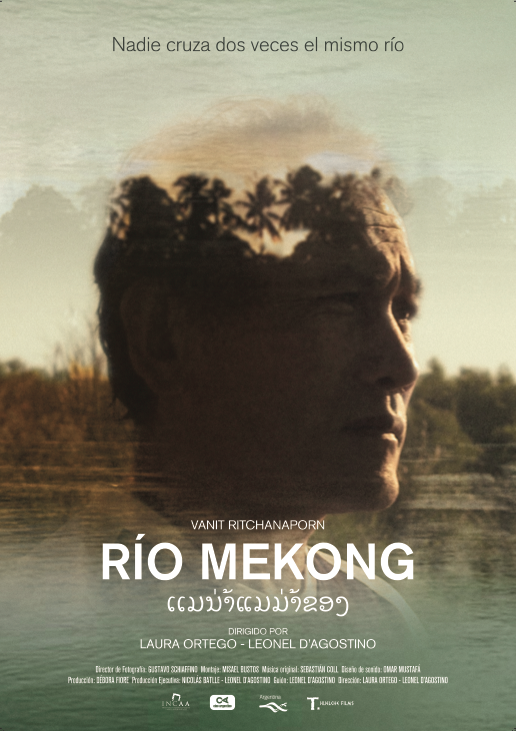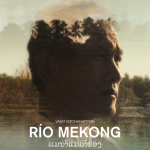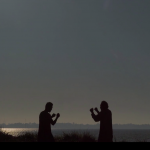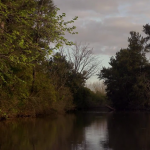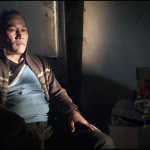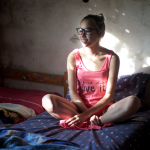Mekong River
– Technical Info / Información Técnica:
(2017) / 01:00:00 / Full HD 1920×1080 / 25 FPS / PAL / COLOR / SOUND DOLBY / Argentina / Documentary feature
– Logline:
Nobody crosses the same river twice.
Nadie cruza dos veces el mismo río.
– Short Synopsis / Sinopsis Corta:
A los 16 años, Vanit cruzó a nado el Río Mekong escapando de su Laos natal. Hoy busca arraigarse en las afueras de Chascomús, donde preside la comunidad laosiana más grande de la provincia de Buenos Aires.
At the age of 16, Vanit Ritchanaporn swam across the Mekong River to escape from his native Laos. Today he lives with his family in the city of Chascomús, where he presides the largest Laotian community in Buenos Aires.
– Synopsis / Sinopsis:
At the age of 16, Vanit Ritchanaporn swam across the Mekong River to escape from the civil war that was taking place in his native Laos after the Vietnam War. In 1979, as an initiative of the United Nations, he arrived as a refugee in Argentina. Today he lives with his family in the city of Chascomús, where he presides the largest Laotian community in Buenos Aires. In each of his daily acts, Vanit seeks to keep alive his memory, to rebuild a bridge with his homeland that has been lost forever.
A los 16 años, Vanit Ritchanaporn cruzó a nado el Río Mekong para escapar de la guerra civil en su Laos natal tras la Guerra de Vietnam. En 1979, por iniciativa de las Naciones Unidas, llegó como refugiado a la Argentina. Hoy vive con su familia en la ciudad de Chascomús, donde preside la comunidad laosiana más grande de la provincia de Buenos Aires. En cada uno de sus actos cotidianos, Vanit busca mantener viva su memoria y reconstruir un puente con su tierra natal que se ha perdido para siempre.
– Director´s Biography / Biografía del Director/es:
LAURA ORTEGO:
LEONEL D´AGOSTINO
LAURA ORTEGO is a photographer, she was born and raised in Comodoro Rivadavia, Patagonia, Argentina. Some of her topics are the construction of identity, the passage from childhood to adulthood, migration and the encounter between East and West. She graduated as a Director of Photography at the National Film School. She obtained scholarships from the Metropolitan Fund for the Arts in 2013, the National Fund for the Arts in 2012 and in 2007 she won the 2nd. Prize at the National Photography Show. Her work was exhibited in several countries around the world. She participated in residences in Beijing, China and in Kyoto and Fukuoka, Japan. She published the books Paranoia -a photographic diary of a film in India- and Girls Beijing. She also collaborates in Dang Dai magazine of China / Argentina cultural exchange. Mekong River, her first documentary feature directed with Leonel D’Agostino has participated in the WIP section of the Festival of Mar de Plata 2016.
LAURA ORTEGO es fotógrafa, nació y se crió en Comodoro Rivadavia, Patagonia, Argentina. La construcción de la identidad, el pasaje de la infancia a la adultez, las migraciones y el encuentro entre oriente y occidente son algunos de sus temas. Egresó de la carrera de Dirección de Fotografía en la ENERC (INCAA). Obtuvo becas del Fondo Metropolitano de las Artes en 2013, del Fondo Nacional de las Artes en 2012 y en 2007 ganó el 2do. Premio en el Salón Nacional de Fotografía. Su obra fue expuesta en varios países. Participó de residencias en Beijing, China y en Kyoto y Fukuoka, Japón. Publicó los libros Paranoia -diario fotográfico de un film en india- y Chicas Beijing y colabora en la revista Dang Dai, de intercambio cultural entre China y Argentina. Río Mekong es su primer largometraje documental dirigido junto a Leonel D’Agostino, que participó en la sección WIP del Festival de Mar de Plata 2016.
Leonel D’Agostino was born in 1975. He graduated as Screenwriter at the National Film School. He is the author of several TV series: Tiempo final (2001), Mosca & Smith (2005), Los siete locos , Los Lanzallamas (2015) and Chromo (2015). He also co-directed and wrote the documentary TV series Gente grande (2011) and Prematuros (2012). He was the screenwriter of a dozen feature films, including the documentaries El Fin del Potemkin (Grand Prix of the Contemporary Section Jury, International Festival of Italy, 2011) and El Rascacielos Latino (2012); and the fictions A través de tus ojos (Best film in the exhibition of Latin American Cinema of Catalonia, 2007), Un amor (South Prize for best adapted script, 2012), Puerta de Hierro: the exile of Perón (2012) and Argentine-Spanish the co-production Nieve negra (2017).
Leonel D’Agostino nació en 1975. Es egresado de la ENERC con el título de Guionista Cinematográfico. Participó como autor en diversas telenovelas y en las miniseries de televisión Tiempofinal (2001), Mosca & Smith (2005), Los Siete Locos y Los Lanzallamas (2015) y Cromo (2015). También codirigió y escribió las series documentales para televisión Gente Grande (2011) y Prematuros (2012). Fue guionista de una decena de largometrajes para cine, entre los que se destacan los documentales El Fin del Potemkin (Gran Premio del Jurado Sección Contemporánea, Festival Internacional de Italia, 2011) y El Rascacielos Latino (2012); y las ficciones A través de tus ojos (Mejor película en la muestra de Cine Latinoamericano de Cataluña, 2007), Un amor (Premio Sur al mejor guión adaptado, 2012), Puerta de Hierro: el exilio de Perón (2012) y la coproducción argentino-española Nieve Negra (2017).
– Director’s Statement / Declaraciónes del Director:
In the late 1970s, in response to a United Nations call, the Argentine military dictatorship welcomed a group of Laotian from refugee camps in Thailand. Without having a state plan drawn up, the refugees were scattered and left to their own in different towns of the countryside. Investigating and photographing, we found a particular story: the one of Vanit Ritchanaporn, a Laotian that crossed the Mekong River to settle in a town in Buenos Aires province. It was that way that we stop in front of that great mystery: the one of a Laotian crossing a river – the threshold between his two lives – to end up in the Argentine pampas, forced to be another one.
The popularity of European immigration, of which a big percentage of our national population
-including our parents and grandparents- is descended, helps to blur the uprooting and that immigrant’s mania, who, far from his land, recreates and remembers – idyllic, falsely – his past, his «faraway land.» But the Laotian families’ customs (who arrived outside the massive immigration’s waves and in a contemporary period) let us see clearly that ghost that floats inside all immigrant families: melancholy, homesickness, saudade, and the conception of a destiny that runs in parallel. Mekong River is the story of Vanit and his family, their search to be recognized as Laotian and, at the same time, as Argentinean.
A fines de la década del 70, en respuesta a una convocatoria de las Naciones Unidas, la dictadura militar argentina acogió a un grupo de laosianos que venían de campos de refugiados en Tailandia. Al no tener un plan estatal trazado, los refugiados quedaron desperdigados y librados a su suerte en distintos pueblos del interior del país. Investigando y fotografiando, encontramos una historia particular: la de Vanit Ritchanaporn, un laosiano que cruzó a nado el Río Mekong para instalarse en un pueblo de la provincia de Buenos Aires. Fue así que nos detuvimos en ese gran misterio: el de un laosiano cruzando un río —el umbral entre sus dos vidas— para terminar en la pampa argentina, obligado a ser otro.
La popularidad de la inmigración europea, de la que desciende un gran porcentaje de la población nacional, incluidos nuestros padres y abuelos, ayuda a desdibujar el desarraigo y esa manía del inmigrante que, lejos de su tierra, recrea y recuerda –idílica, falsamente– su pasado, su «lejana tierra mía». Pero las costumbres de las familias laosianas (que llegaron fuera de las olas inmigratorias, masivas y en un período contemporáneo) permiten ver con mayor claridad ese fantasma que flota en el interior de todas las familias de inmigrantes: la melancolía, la saudade, la nostalgia, y la concepción de un destino que corre en paralelo. Río Mekong es la historia de Vanit y su familia, su búsqueda de ser reconocido como laosiano y, al mismo tiempo, como argentino.
– Overview / Ficha técnica:
Direction/Director: Laura Ortego, Leonel D´Agostino
Script / Guión: Laura Ortego, Leonel D´Agostino
Producer / Producción: Nicolás Batlle, Leonel D’Agostino
Production Manager / Jefe de producción: Débora Fiore
Executive Productor / Productor Ejecutivo: Nicolás Batlle, Leonel D’Agostino
Director of Photography and Camera / Dirección de Fotografía y Cámara: Gustavo Schiaffino
Second Camera / Registros: Gustavo Tarrio, Laura Ortego
Post Production/Post producción: Tehuelche Films
Film Editor / Edición: Misael Bustos
Sound design / Diseño de sonido: Omar Mustafá
Sound Mix / Mezcla de Sonido: Monociclo Sonido, Guillermo Lombardi, Juan Martin Jimena
Música / Music: Sebastián Coll
Color Correction / Corrección de Color: Laura Viviani
– Festivals, Awards and Nominations / Festivales, Premios y Nominaciones:
– Mar del Plata International Film Festival: Work In Progress Competition; 11/2016; Argentina
– Links:
– Contact / Contacto:
FilmsToFestivals
